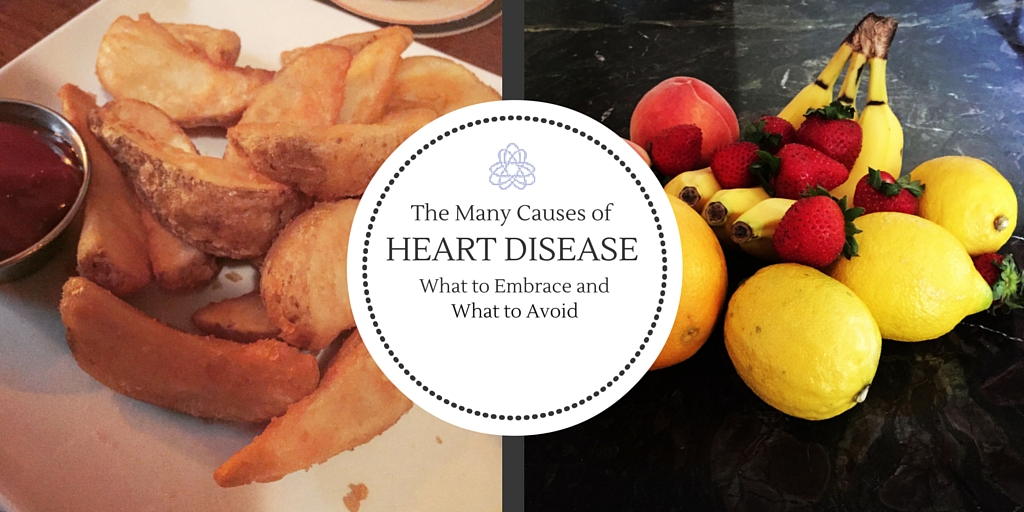 What causes heart disease and “clogged arteries” (i.e. atherosclerosis)? Well, there are many contributing factors to look at when exploring the causes of heart disease. The first step is to understand the nature of the disease itself, which is explained in my previous post: The Truth About Clogged Arteries. Next, you’ll want to take a step back—keeping your eye on the big picture—and begin to explore the several different avenues that may lead to cardiovascular problems. Three significant causes of atherosclerosis and other forms of heart disease include: poor dietary habits, elevated stress, and the overgrowth of bacteria within the intestinal microbiome.
What causes heart disease and “clogged arteries” (i.e. atherosclerosis)? Well, there are many contributing factors to look at when exploring the causes of heart disease. The first step is to understand the nature of the disease itself, which is explained in my previous post: The Truth About Clogged Arteries. Next, you’ll want to take a step back—keeping your eye on the big picture—and begin to explore the several different avenues that may lead to cardiovascular problems. Three significant causes of atherosclerosis and other forms of heart disease include: poor dietary habits, elevated stress, and the overgrowth of bacteria within the intestinal microbiome.
Poor-Quality Diet High in PUFAs
Many people believe that a heart-healthy diet is one that avoids cholesterol. However, if you read my earlier post, What Is Bad Cholesterol Good for Anyway?, you know that cholesterol is a protective substance produced by the body under stress and is important in the process of healing. Even the FDA is finally on board with the undeniable fact that dietary cholesterol does not contribute to heart disease, stating that “cholesterol is not considered a nutrient of concern for overconsumption.”1
Polyunsaturated fatty acids (PUFAs), on the other hand—while still considered the healthier alternative by conventional medicine—most certainly contribute to heart disease. The consumption of PUFAs (a.k.a. unsaturated vegetable oils) causes cell dysfunction and impaired metabolism, which in turn leads to atherosclerosis (a.k.a. clogged arteries) and other forms of cardiovascular disease.2
Elevated Stress Load
Elevated stress is another common path to heart disease. Stress of all sorts leads to the hormonal and metabolic state that promotes the vascular dysfunction leading to atherosclerosis. Cortisol as well as other metabolic measures, such as free fatty acids, glucose handling, abdominal fat gain, and thyroid deficiency, are well understood to coincide with heart disease. Chronic stress is an underlying stimulus for all of these variables.
Overgrowth of Intestinal Bacteria
Finally, a third important variable to consider is exposure to endotoxin, the byproduct of the gram negative bacteria within the intestinal microbiome. Intestinal bacterial overgrowth (even the overgrowth of “healthy” bacteria) or inflammation-induced intestinal compromise allows an overexposure to lipopolysaccharides (endotoxin). Exposure to endotoxin is highly correlated with the conditions that promote heart disease.3-5
How to Prevent the Causes of Heart Disease
Correcting poor dietary habits and reducing stress are two key components in preventing the causes of heart disease. A high-quality diet and low stress load will help create the optimal conditions for your system by reducing oxidized lipids, increasing glucose metabolism, and reducing exposure to endotoxin. As these are the most general variables surrounding the conditions likely underlying the quality of the vascular walls, it would be intelligent to consider their importance in reducing your risk for cardiovascular disease.
To help prevent the causes of heart disease, avoid fried foods and vegetable oils, eat a diet high in fruit and whole foods, and make lifestyle adjustments to help reduce your global stress load.
For more info on the latest topics in health and nutrition, sign up for my newsletter. Want to try a new workout method that’s great for spine health, strength and stability, and flexibility? Join us for ELDOA group classes right here in St. Louis!
References
- Neuhouser M, Lichtenstein AH, Abrams S, et al. Science base chapter: food and nutrient intakes, and health: current status and trends. 2015 DGAC: Meeting 7 (Dec 2015). http://health.gov/dietaryguidelines/2015-BINDER/meeting7/docs/DGAC-Meeting-7-SC-1.pdf
- Kummerow FA. Interaction between sphingomyelin and oxysterols contributes to atherosclerosis and sudden death. Am J Cardiovasc Dis 3, No. 1 (2013): 17-26. http://www.ncbi.nlm.nih.gov/pmc/articles/PMC3584645/
- Wiedermann CJ, Kiechl S, Dunzendorfer S, et al. Association of endotoxemia with carotid atherosclerosis and cardiovascular disease: prospective results from the Bruneck Study. J Am Coll Cardiol 34, No. 7 (Dec 1999): 1975-1981. http://www.ncbi.nlm.nih.gov/pubmed/10588212
- Shibata N, Glass CK. Regulation of macrophage function in inflammation and atherosclerosis. J Lipid Res 50 Suppl (Apr 2009): S277-S281. http://www.ncbi.nlm.nih.gov/pmc/articles/PMC2674700/
- Lehr HA, Sagban TA, Ihling C, et al. Immunopathogenesis of atherosclerosis: endotoxin accelerates atherosclerosis in rabbits on hypercholesterolemic diet. Circulation 104, No. 8 (Aug 2001): 914-920. http://www.ncbi.nlm.nih.gov/pubmed/11514379







1 Comment